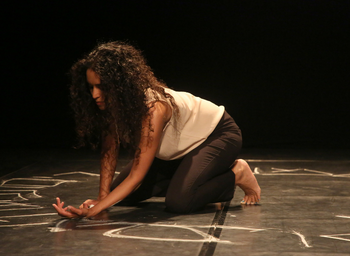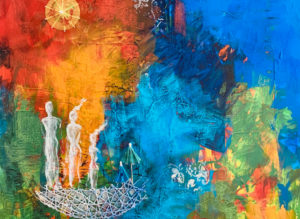A Thin Line | Efrat Nehama
(18 min) “A Thin Line” was created as a choreo-poetic* action, in an attempt to explore my written poetry through body movement. The connection between the two dimensions–poetry and dance, word-speech and body–offered additional possibilities of imagination, color, and content, and demanded deep connections within me. I decided to take the first chapter from my book of poetry and explore it in a movement-oriented way. The chapter contains personal and painful poetry about the way we are in the world. The poems present a contemporary reality that responds to the Jewish story of the creation of the world. According to Jewish tradition and Kabbalistic ideas, God creates existence out of chaos through words, and in order to establish order, He creates a world that is beyond His control. The dance, as well as the poetry, search between the reality of disorder and order, of chaos facing creation; they choose to be found, ultimately, in the empty and comforting space that exists between.
*Choreo-poetics = the connection between poetry and dance. This term was coined by the poet and playwright Ntozake Shange in the USA in 1976.
“I abandon the words till they’ll be lost forever And there will remain from them not a noun not an adjective and not an action, And all the consonants will be marginal So much so, to the point that only movement will remain festive and flowing, bridal, between us. And in that air, we will be breathing and expanding, With no tools, no body and no… Just us A scribble In sp ..a c e.”
—Translated excerpt from “Once We Understand”, one of the poems referenced in this piece.
The work was staged in Jerusalem at the Machol Shalem Center, July 2019.
Still photography: Natasha Shehans
Video: Yoana Belikman
Efrat Nehama is a choreographer, poet and performing artist who lives and works in Jerusalem.
Reflections
To what extent can a written/spoken word affect your movement in the world?
What do you think has more presence and influence? Word or movement?
Can you imagine a reality of presence in the empty space between words and movement? What is the experience that you gain, and what do you lose?
Want more?
Get curated JewishArts.org content in your inbox



